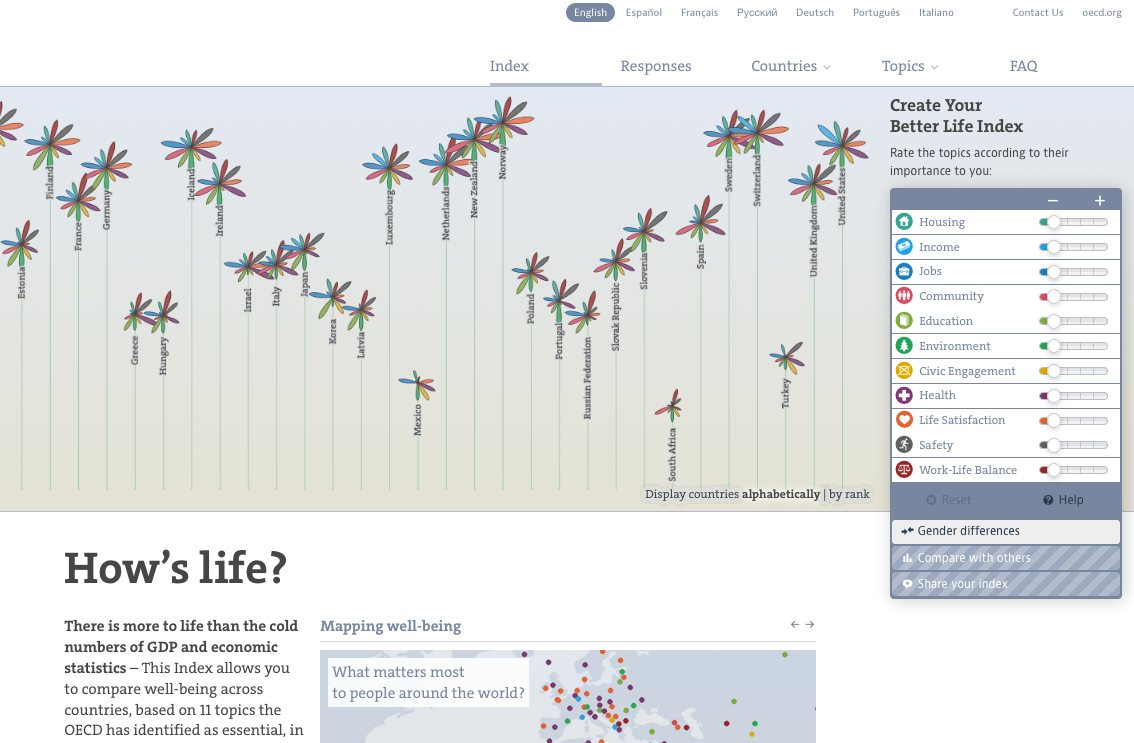
2 Jun, 2016
Path to happiness lies in good health and a good job, OECD Better Life Index shows
Paris, 31 May 2016, OECD media release – Being healthy and having a good job are two of the most important ingredients associated with subjective well-being, according to the latest data from the OECD’s Better Life Index.
It shows life satisfaction is generally highest in Denmark, Norway and other Nordic nations, as well as in Switzerland, New Zealand, Canada and Australia – countries which score highly on employment levels, the quality of jobs and the health of the population.

In the countries where life satisfaction is lowest, employment levels and, frequently, life expectancy are below the OECD average.
The Better Life Index (BLI) shows that having strong networks of friends and connections and enjoying a good work-life balance and personal safety are also associated with high life satisfaction. Again, Nordic countries score highly in these areas but also Spain where data underlying the BLI show 96% of people say that they know someone they could rely on in time of need, one of the highest proportions in the OECD.
The BLI shows little difference in life satisfaction between men and women across the 38 countries covered by the Index. However, people who have been educated to university level in OECD countries tend to have higher levels of life satisfaction than those who have only completed primary education.
The BLI covers 38 countries and measures well-being across 11 dimensions: housing, income, jobs, community, education, environment, civic engagement, health, life satisfaction, safety and work-life balance. It shows that the good economic performance of a country does not necessarily mean an equally good performance across the spectrum of well-being indicators. For instance, Turkey and Mexico perform strongly in some forms of civic engagement. South Africa scores poorly on many of indicators compared with richer countries, but has a relatively strong sense of community and work-life balance.
Personal security is an issue also in some higher income countries. The BLI shows feelings of insecurity are high in the US, Australia and New Zealand.
Above-average performers in work-life balance include countries with varied economic performance, such as Russia, Hungary, Italy and Ireland. And Estonia, Poland, Korea, Japan and Germany are among the group of countries with the best general levels of education and skills.
Decent housing is an important factor behind well-being. Here the BLI shows that good housing conditions are generally associated with good economic outcomes. Americans and Canadians tend to enjoy the best housing conditions.
The 2016 update to the BLI includes data from two new countries: Latvia and South Africa. Although life satisfaction among Latvians is below the OECD average, the country scores relatively well in terms of education and skills.
The BLI’s online interactive tool also allows users to express directly what is important to their own well-being. To date more than 110,000 people in 180 countries have used that tool. Overall, online users rank life satisfaction, health and education as the most important factors for their well-being. But regional differences emerge. In Latin America, education is generally rated as the most important of the 11 well-being dimensions. In North America, life satisfaction and work-life balance are the top priorities, while in Europe the main concerns are health, community and the environment.
To express what is important in your life visit http://www.oecdbetterlifeindex.org/ or explore user responses by country, age group and gender http://www.oecdbetterlifeindex.org/responses.



Liked this article? Share it!